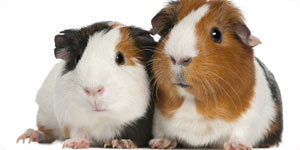
Guinea pigs will rarely recover from illnesses without the care of a veterinarian. Though few people take these pets to the vet because of their small size, it greatly improves your pet guinea pig’s recovery chances if signs of illness are recognized early and your guinea pig is seen by the vet. Here’s how to know if a pet guinea pig is ill:
- Check the body of your pet for signs of illness. The body of a guinea pig that is healthy feels firm and solid. Bald spots located behind both ears are common, but baldness elsewhere on the body may be a sign of illness or disease. Guinea pigs often exhibit skin issues as one of the first signs of illness, so watch out for red or balding patches. This can be a sign of many different illnesses. It is also possible that you guinea pig has fleas, which can be found with a flea comb. Mites, which can make your guinea pig scratch his skin until open sores develop, can be fatal in guinea pigs due to their small size. If you see these types of symptoms, your guinea pig should visit the vet immediately.
- Check the guinea pig’s eyes, nose, and ears. A guinea pig’s eyes should be bright and clear. Crustiness or discharge may be a sign that your pet guinea pig is ill. Any discharge in the nose can also be a sign of illness. A guinea pig walking with difficulty, or with the head held to one side, may have an ear infection.
- Check the stool. Occasionally look at your guinea pig’s droppings. Diarrhea is a common sign of illness in guinea pigs. So are droppings that are watery or block. Feeding your guinea pig a diet of timothy hay rather than fruits and vegetables can alleviate this symptom.
- Observe the guinea pig’s behavior. Illnesses often have physical as well as behavioral symptoms. Any changes in your guinea pig’s daily behaviors or routine may indicate illness. Common signs include weight loss, lethargy, and difficulty breathing. These can be signs of a wide range of illnesses; the most common is scurvy, or Vitamin C deficiency. Labored breathing or rattling coming from the lungs can be an indicator of upper respiratory infections or allergies, both of which are common afflictions of pet guinea pigs.
- Track your guinea pig’s eating habits. Most guinea pigs seem to be eating all of the time. That is normal. If your guinea pig stops eating or drinking, it may be a sign that he’s not feeling well. When guinea pigs stop eating, this can be a sign of a serious illness, and it should not be taken lightly. Guinea pigs can even develop anorexia, which must be treated by a veterinarian.
Timely treatment is essential in order your pet guinea pig to survive any infection or illness. Guinea pigs may exhibit a wide range of symptoms, both behavioral and physical, when they are ill. Any changes in your pet should be investigated fully; most of these illnesses require a vet visit if you want your pet guinea pig to recover.
